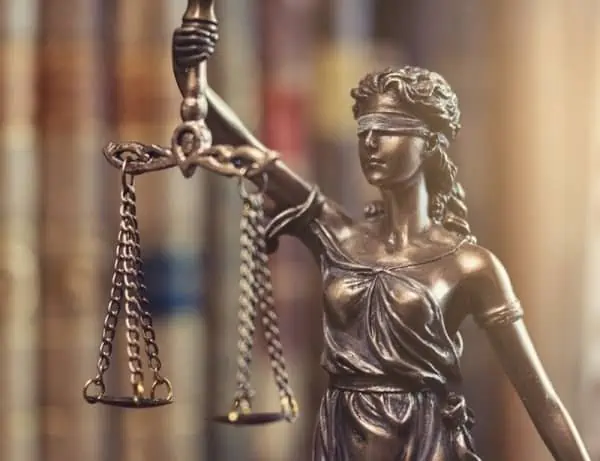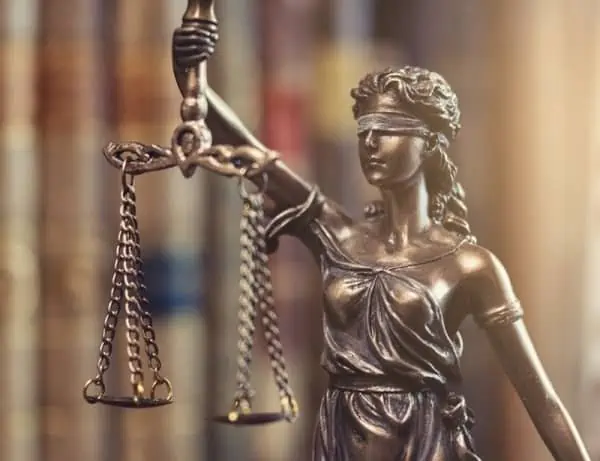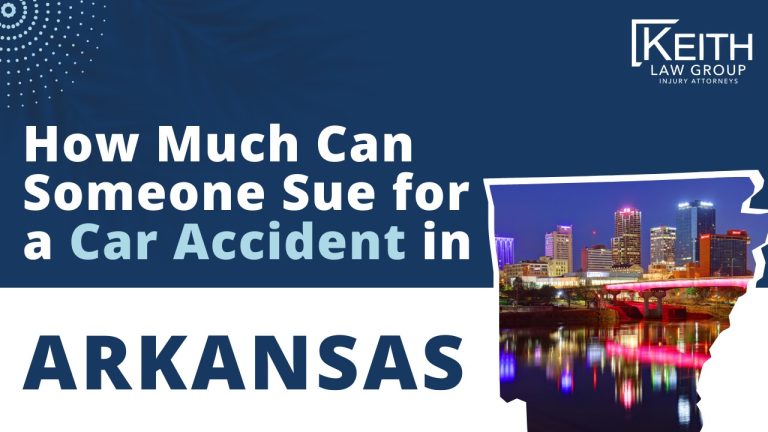- Published: May 29th, 2024
- Last Updated: July 14th, 2025

Attorney Sean T. Keith has been a personal injury lawyer for 30+ years, a nationally recognized Top 100 Trial Lawyer, and top car accident lawyer & motor vehicle accident lawyer in Arkansas.
Legally Reviewed
This article has been written and reviewed for legal accuracy and clarity by the team of writers and attorneys at Keith Law Group and is as accurate as possible. This content should not be taken as legal advice from an attorney. If you would like to learn more about our owner and experienced injury lawyer, Sean T. Keith, you can do so here.
Fact-Checked
Keith Law Group does everything possible to make sure the information in this article is up to date and accurate. If you need specific legal advice about your case, contact us. This article should not be taken as advice from an attorney.
Sean Keith's Accollades & Practice Areas He Specializes In
- Over $20 Million recovered in Medical Device Injury Lawsuits.
- Over $13 Million recovered in Car Accident Lawsuits and other Motor Vehicle Accident Lawsuits.
- Over $100 Million recovered in total on behalf of clients.
- Sean represents clients in cases involving personal injuries, car accidents, motorcycle accidents, truck accidents, wrongful death, slip and falls, nursing home abuse cases, nursing home elopement cases, and more.
Overview of How to File a Police Report After a Car Accident in Arkansas
On this page, we’ll discuss how to file a police report after a car accident in Arkansas, information to include when filing a police report after an Arkansas car accident, how an Arkansas car accident lawyer can help you, and much more.

Intro to How to File A Police Report in Arkansas
- Date, Time, and Location: Specify the exact date, time, and precise location where the incident occurred. Ensure the address or location description is accurate and detailed.
- Involved Parties: List all individuals or entities involved in the incident. Include their full names, contact information (phone number and email address), and insurance details (insurance company name and policy number).
- Witness Information: Record the names and contact information (phone number and email address) of any witnesses who saw the incident.
- Description of the Incident: Include all relevant details, such as the sequence of events, any injuries sustained, and the extent of property damage. Avoid speculation and focus on clear, objective facts.
If you’ve been involved in a car accident in Arkansas, understanding the importance of filing a police report can help protect your rights.
Contact Keith Law Group using the chat on this page to receive an instant case evaluation to determine the extent of your damages.
Table of Contents
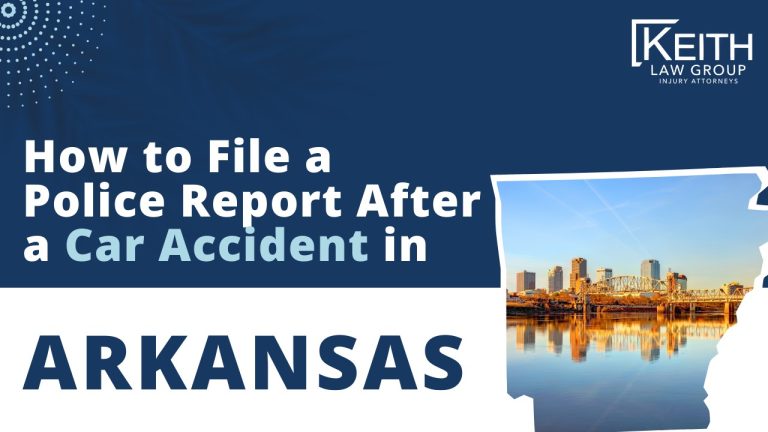
Learning How to File a Police Report After a Car Accident in Arkansas
Arkansas law mandates drivers file a police report for any accident resulting in injury, death, or property damage exceeding $1,000.
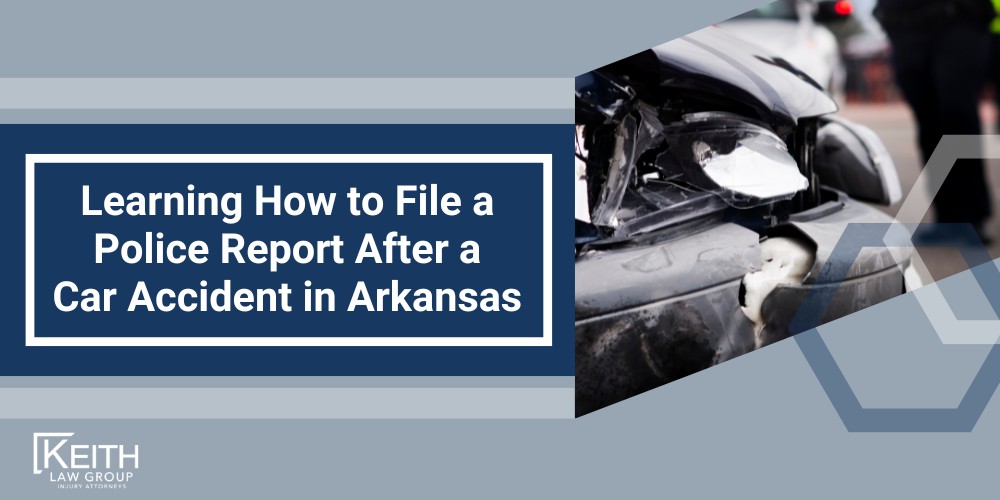
However, even if the accident does not meet these criteria, it is still advisable to file a report to protect your interests and create an official record of the incident.
Scenarios that necessitate filing a police report in Arkansas include:
- Accidents Resulting in Injury or Death: Any accident that causes injury or fatality must be reported.
- Property Damage Exceeding $1,000: If the total property damage is estimated to be over $1,000.
- Uninsured or Underinsured Drivers: Filing a report is crucial if the other driver lacks sufficient insurance coverage.
- Hit-and-Run Accidents: If the other driver flees the scene, a police report is essential for tracking them down and holding them accountable.
It’s always best to err on caution when in doubt and file a police report.
This can save you from potential legal issues and difficulties with insurance claims.
Steps to Take When Filing a Police Report in Arkansas
Taking the right steps when filing a police report is important to ensure that all relevant details are captured accurately and provide a reliable account of the incident for future reference.
Here are the steps to take when filing a police report in Arkansas:
- Check On Other Parties Involved: Immediately after the accident, check on the well-being of the other driver, passengers, and any pedestrians involved. Call for emergency medical assistance if anyone is injured.
- Contact the Police: Call 911 or the local non-emergency number to report the accident and request an officer at the scene. Provide the dispatcher with your location, number of vehicles involved, and any known injuries.
- Gather Information: While waiting for the police to arrive, exchange contact and insurance information with the other driver. Collect names and contact details of any witnesses.
- Document the Scene: Take photos of the accident scene, vehicle damage, and any visible injuries. These images can serve as valuable evidence for your claim.
- Provide a Statement: When the officer arrives, give a clear, factual account of what happened. Stick to the facts and avoid admitting fault or speculating about the cause of the accident.
- Obtain a Copy of the Report: Ask the officer how you can obtain a copy of the police report for your records. You may need to contact the police department or visit their website to request a copy.
- Notify Your Insurance Company: Contact your insurance provider to report the accident and provide them with a copy of the police report. This will initiate the claims process.
- Consult with an Attorney: If you’ve been injured or have questions about your rights, consult with an experienced Arkansas car accident attorney who can guide you through the legal process and protect your interests.
Contact the Police Immediately After the Accident
Once you’ve determined that you must file a police report, contact law enforcement immediately.
In most cases, you should call 911 to dispatch an officer to the accident scene.
Provide the dispatcher with your location, the number of vehicles involved, and any known injuries.
Make sure to provide the following information when calling the police:
- Location of the Accident: Provide the exact address or a detailed location description.
- Number of Vehicles Involved: Let the dispatcher know how many vehicles were involved in the accident.
- Injuries or Potential Hazards: Report any known injuries or hazards, such as fuel leaks or traffic blockages.
- Your Contact Information: Give the dispatcher your name and phone number if they need to reach you.
If the accident is minor and the vehicles are movable, you may be asked to move to a safer location nearby to wait for the officer.
Always prioritize safety and follow the dispatcher’s instructions.
Provide Accurate Information to the Responding Officer
When the police officer arrives at the scene, they will ask for your account of the accident and collect information from all parties involved.
It’s crucial to provide accurate and honest information to the best of your ability.
Details to share with the responding officer include:
- Your Driver’s License and Insurance Information: The officer must verify your identity and insurance coverage.
- A Detailed Account of the Accident: Describe how the accident occurred, including any relevant details leading up to the incident.
- Witness Information: If there were any witnesses to the accident, provide their names and contact information to the officer.
- Photos or Videos of the Scene: If you have taken any photos or videos of the accident scene, damage, or injuries, share them with the officer.
Remember to remain calm and cooperative when interacting with the police officer.
Stick to the facts and avoid admitting fault or making speculative statements about the cause of the accident.
Benefits of Filing an Arkansas Police Report for Your Accident
Filing a police report after an accident in Arkansas provides numerous benefits that can protect your interests and support your insurance claim or legal case.
Having an official record of the incident and documenting key details can prevent potential disputes and strengthen your position.
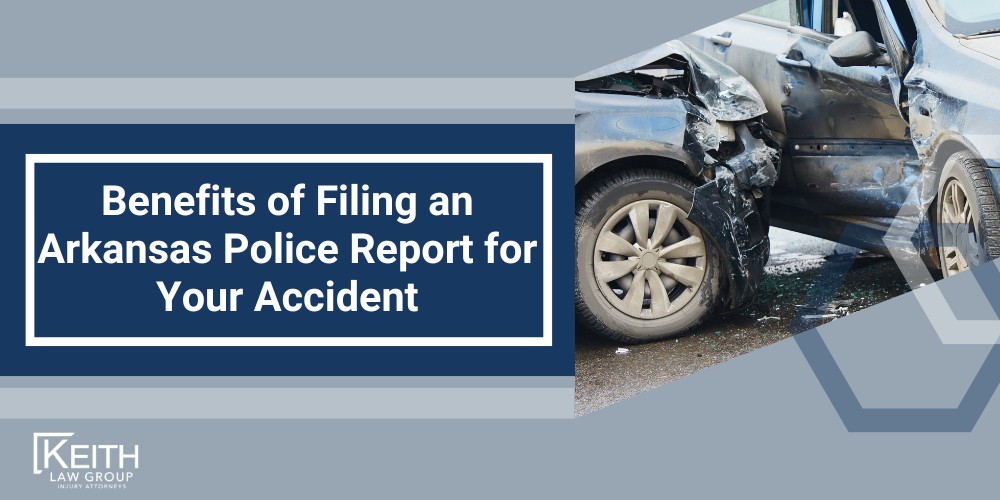
A police report is valuable evidence that can help establish fault, document damage and injuries, and provide an unbiased account of the accident.
This can be crucial when dealing with insurance companies or if legal proceedings become necessary.
Establishes an Official Record of the Incident
One of the primary benefits of filing a police report is that it creates an official record of the accident.
This document is an unbiased account of the incident, including details about the parties involved, vehicle damage, and any injuries sustained.
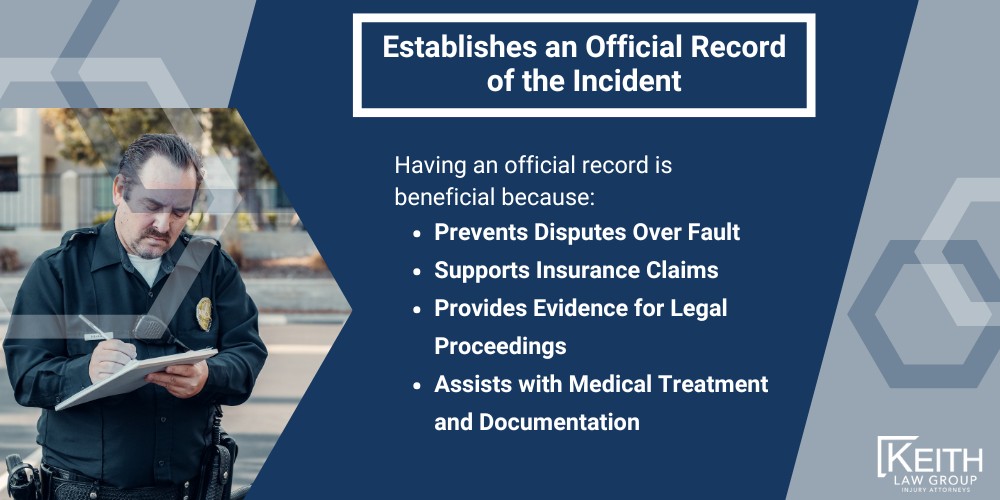
Having an official record is beneficial because:
- Prevents Disputes Over Fault: The police report can help establish liability and prevent the other party from changing their story later.
- Supports Insurance Claims: Insurance companies often rely on police reports when processing claims and determining fault.
- Provides Evidence for Legal Proceedings: The police report can be valuable evidence if you need to file a lawsuit or defend yourself in court.
- Assists with Medical Treatment and Documentation: The report can help document any injuries sustained in the accident, which is crucial for seeking medical treatment and compensation.
Without an official police report, proving what happened during the accident and protecting your interests in the aftermath can be much more challenging.
Supports Your Insurance Claim and Legal Case
Filing a police report can significantly strengthen your insurance claim and legal case following an accident.
Insurance companies and legal professionals often use the information in the report to make decisions and build cases.
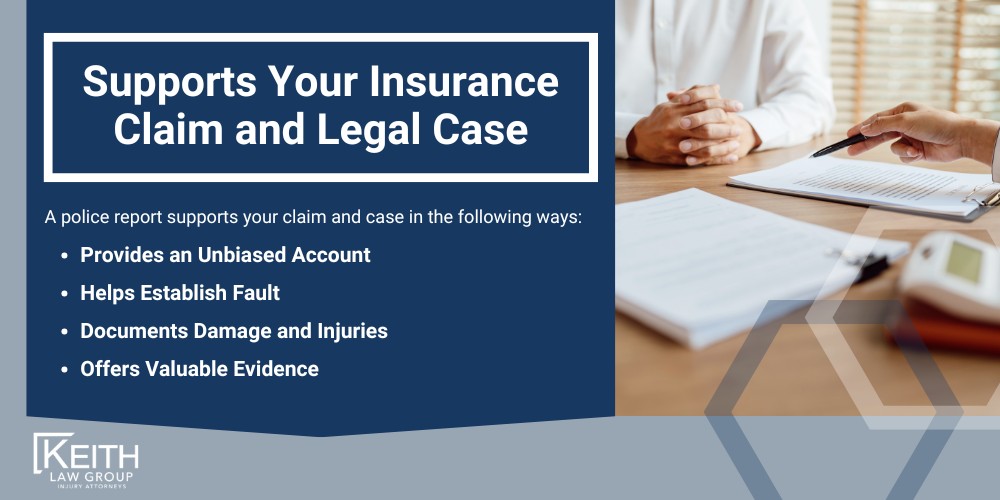
A police report supports your claim and case in the following ways:
- Provides an Unbiased Account: The report offers an objective view of the accident, which can be valuable when dealing with insurance companies or in legal proceedings.
- Helps Establish Fault: The officer’s assessment of the accident can help determine who was at fault, which is crucial for insurance claims and legal cases.
- Documents Damage and Injuries: The report will include details about vehicle damage and any injuries reported at the scene, which can support your insurance claim and personal injury case.
- Offers Valuable Evidence: In the event of a lawsuit, the police report can serve as key evidence to support your case.
By having a police report on file, you can bolster your position when seeking compensation for damages or defending yourself in legal proceedings related to the accident.
Consequences of Not Filing a Police Report in Arkansas
Failing to file a police report after an accident in Arkansas can lead to significant consequences that may hinder your ability to seek compensation or protect your legal rights.
Without an official record of the incident, you may face challenges when dealing with insurance companies or if the other party changes their story.
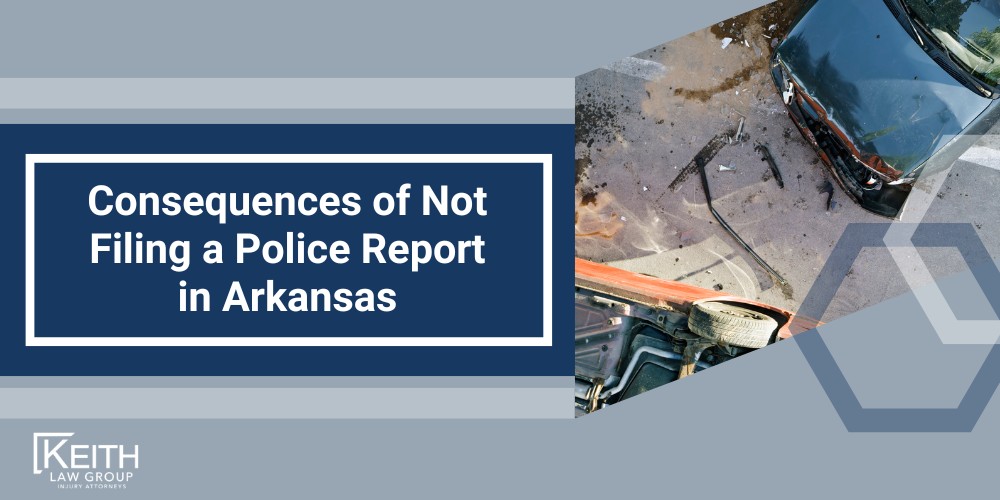
Not having a police report can make it difficult to prove fault, document damages and injuries, and support your case in legal proceedings.
This can result in delayed or denied insurance claims, weakened legal positions, and potential financial losses.
Difficulty Proving Fault Without an Official Record
Failing to file a police report after an accident can make proving fault and protecting your interests much more challenging.
Without an official record of the incident, it becomes a matter of “he said, she said,” which can complicate insurance claims and legal proceedings.
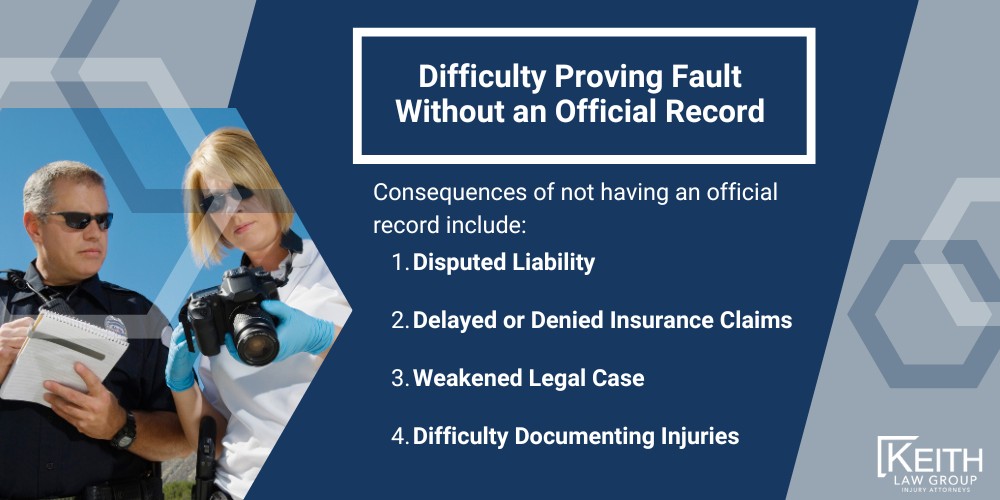
Consequences of not having an official record include:
- Disputed Liability: Without a police report, the other party may attempt to deny fault or change their story, making it difficult to establish liability.
- Delayed or Denied Insurance Claims: Insurance companies may be hesitant to process your claim without a police report, leading to delays or even denials.
- Weakened Legal Case: If you need to pursue legal action, the lack of a police report can weaken your case and make it harder to prove fault and damages.
- Difficulty Documenting Injuries: Without a report documenting injuries at the scene, it may be more challenging to link your injuries to the accident and seek compensation.
By not filing a police report, you risk being disadvantaged when proving fault and protecting your rights following an accident.
Potential for the Other Party to Change Their Story
Without a police report, there is a significant risk that the other party involved in the accident may change their story or deny fault altogether.
This situation can create a frustrating and uphill battle when seeking compensation for damages.
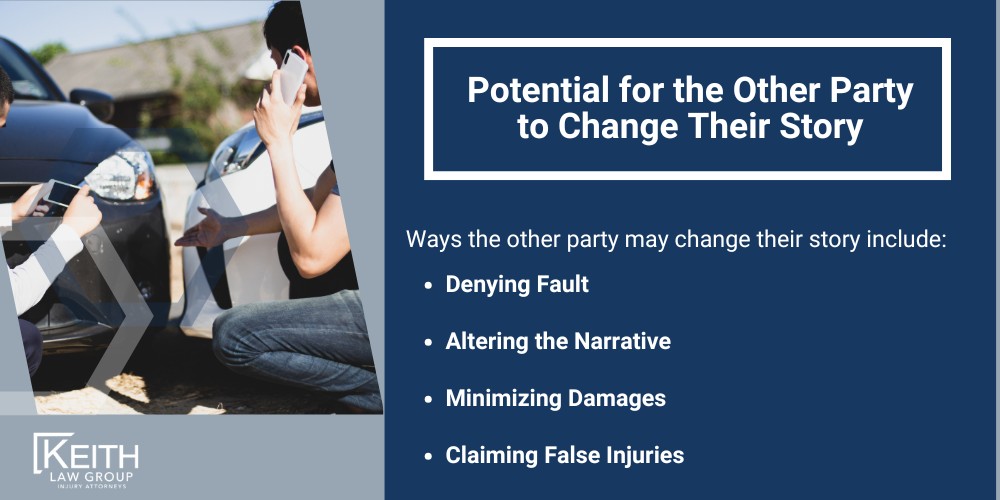
Ways the other party may change their story include:
- Denying Fault: Even if the other driver admitted fault at the scene, they may later deny responsibility or claim you were at fault.
- Altering the Narrative: The other party may modify their account of the accident to shift blame onto you.
- Minimizing Damages: Without an official record, the other driver may attempt to downplay the extent of vehicle damage or injuries sustained.
- Claiming False Injuries: In some cases, the other party may even claim injuries that did not occur during the accident to seek compensation from your insurance.
Filing a police report helps mitigate the risk of the other party changing their story by providing an official, unbiased account of the accident that can be referenced in insurance claims and legal proceedings.
How an Arkansas Car Accident Attorney Can Help
Working with an experienced Arkansas car accident attorney can provide invaluable support through the aftermath of an accident.
From assisting with filing an amended police report to gathering evidence and representing your interests, an attorney can help protect your rights and seek the compensation you deserve.
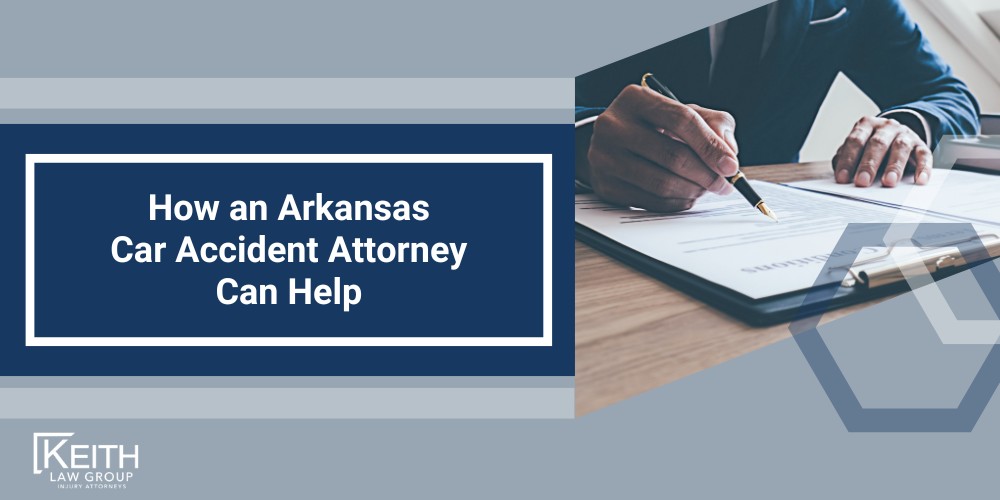
An attorney can also communicate with insurance companies on your behalf, ensuring that your claim is handled fairly and that you are not taken advantage of during the process.
With their knowledge and resources, an Arkansas car accident attorney can be a powerful ally in your corner.
Assistance with Filing an Amended Police Report
If you fail to file a police report at the accident scene or need to change an existing report, an experienced Arkansas car accident attorney can help.
They can guide you through filing an amended report and ensure all necessary information is included.
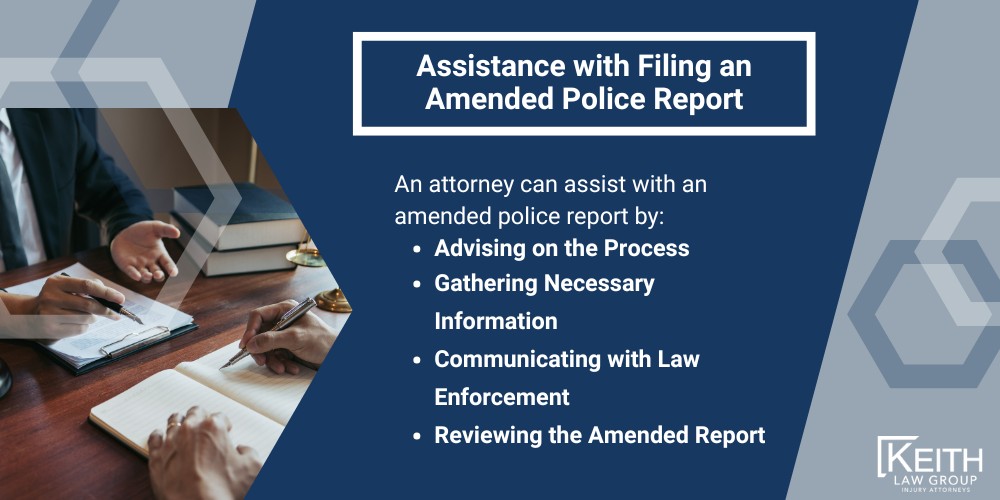
An attorney can assist with an amended police report by:
- Advising on the Process: Your attorney can explain the steps in filing an amended report and help you navigate the process.
- Gathering Necessary Information: They can help you collect any additional information or evidence needed for the amended report.
- Communicating with Law Enforcement: Your attorney can communicate with the Arkansas police department to ensure the amended report is filed correctly and on time.
- Reviewing the Amended Report: Before submitting the amended report, your attorney has permission to review it to ensure accuracy and completeness.
By working with an attorney to file an amended police report, you can protect your rights and strengthen your case, even if you did not file a report initially.
Gathering Evidence to Support Your Claim
An experienced car accident attorney can be invaluable in gathering evidence to support your insurance claim or legal case.
They have the resources and knowledge to investigate the accident thoroughly and build a strong case on your behalf.

Evidence an attorney may gather to support your claim includes:
- Police Reports: Your attorney will obtain a copy of the police report and review it for accuracy, crimes, and key details.
- Witness Statements: They may interview witnesses and obtain written statements to support your account of the accident.
- Photos and Videos: Your attorney can collect any photos or videos of the accident scene, vehicle damage, and injuries to strengthen your case.
- Medical Records: They will gather your medical records and bills to document the extent of your injuries and treatment related to the accident.
By thoroughly investigating the accident and gathering relevant evidence, your attorney can build a compelling case to help you seek the compensation you deserve.
Real-Life Example: Motorcycle Accident in Arkansas
To illustrate the importance of filing a police report and the potential consequences of not doing so, let’s examine a real-life example involving a motorcycle accident in Arkansas.
This case highlights how the other driver’s change in story complicated our client’s insurance claim and legal process.
By understanding the challenges faced in this case and the role a police report could have played, you can better appreciate the significance of filing a report after any accident, regardless of the circumstances.
Client’s Experience with the Other Driver Changing Their Story
In a recent case, our client was involved in a motorcycle accident in Arkansas.
The other driver initially admitted fault at the scene, apologizing and providing their insurance information.
However, when the insurance company got involved, the other driver changed their story and claimed our client was at fault.
Details of the case include the following:
- Accident Description: Our client was riding their motorcycle when a car pulled out in front of them, causing them to lay down the bike and slide underneath it.
- Injuries Sustained: Our client suffered a serious leg injury requiring extensive medical treatment.
- Initial Admission of Fault: At the scene, the other driver acknowledged their fault and apologized to our client.
- Change in Story: When the other driver’s insurance company became involved, they denied fault and claimed our client was responsible for the accident.
This case highlights the importance of filing a police report and gathering evidence at the scene.
These steps can help prevent the other party from changing their story and denying fault later.
Importance of Filing a Police Report in This Case
In this motorcycle accident case, filing a police report would have been crucial in establishing fault and protecting our client’s rights.
Even though the other driver initially admitted fault, their change in story complicated the insurance claim and legal process.
Filing a police report could have helped in this case by:
- Documenting the Other Driver’s Admission of Fault: If the responding officer had taken a statement from the other driver admitting fault, it would have been included in the police report.
- Providing an Unbiased Account: The police report would have offered an objective description of the accident, which could have helped counter the other driver’s change in their story.
- Supporting the Insurance Claim: With a police report establishing the other driver’s fault, the insurance company may have been more likely to accept liability and promptly process our client’s claim.
- Strengthening the Legal Case: If the case had gone to trial, the police report could have served as valuable evidence to support our client’s claim and challenge the other driver’s credibility.
Although our client took steps to gather information at the scene, filing a police report would have provided an additional layer of protection and support for their case.
What if the Other Driver Admits Fault at the Scene?
Even if the other driver admits fault at the accident scene, it is still crucial to file a police report.
Verbal admissions of fault can be retracted or denied later, leaving you without proof of the other party’s responsibility.
Reasons to file a police report even when the other driver admits fault include:
- Documenting the Admission: A police report can document the other driver’s admission of fault, providing an official record of their statement.
- Preventing Changes in Story: With a police report on file, it becomes more difficult for the other driver to change their story or deny fault later.
- Supporting Insurance Claims: Insurance companies often require a police report when processing claims, regardless of verbal admissions of fault.
- Protecting Your Rights: Filing a police report helps protect your rights and interests, even if the other driver seems cooperative at the scene.
Remember, verbal admissions of fault are not legally binding and can be easily retracted.
Always protect yourself by filing a police report, regardless of what the other driver says at the scene.
Keith Law Group: The #1 Car Accident Lawyer In Arkansas
Our experienced Arkansas car accident attorneys are dedicated to helping clients understand the legal process following an accident.
We understand the importance of filing a police report and gathering evidence to support your case, and we’re here to guide you every step of the way.

Our team has a proven track record of success in handling car accident cases, and we’re committed to fighting for the compensation our clients deserve.
If you’ve been involved in a car accident in Arkansas, don’t hesitate to contact us for a free consultation.
Always File a Police Report, Regardless of Fault
At Keith Law Group, we strongly advise all our clients to file a police report after any car accident, regardless of who appears to be at fault.
As experienced Arkansas car accident attorneys, we have seen countless cases where failing to file a report has led to complications and difficulties for our clients.
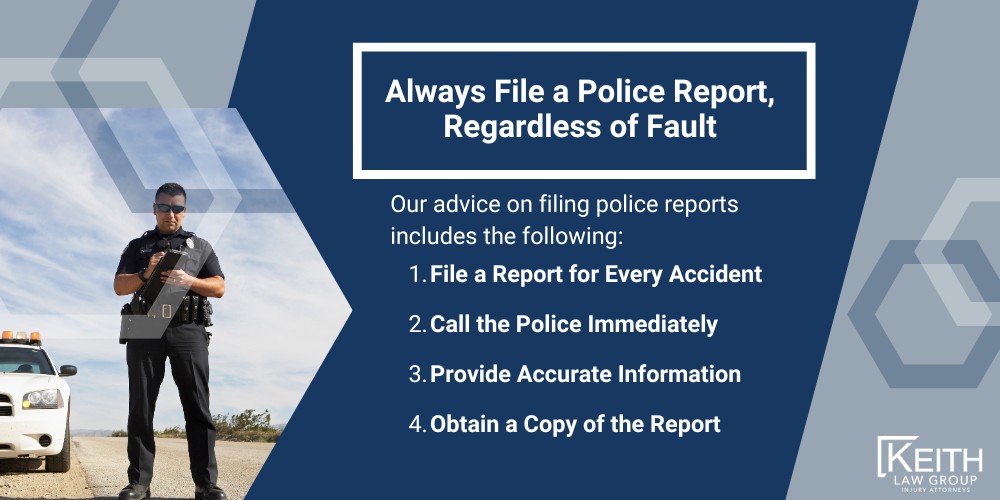
Our advice on filing police reports includes the following:
- File a Report for Every Accident: No matter how minor the accident may seem or who appears to be at fault, always file a police report to protect your interests.
- Call the Police Immediately: Contact law enforcement immediately to report the accident and request an officer be sent to the scene.
- Provide Accurate Information: Give the responding officer a clear, honest account of the accident, and avoid admitting fault or making speculative statements.
- Obtain a Copy of the Report: Request a copy of the police report and any online police report for your records, as it will be essential for insurance claims and legal proceedings.
By consistently filing police reports, you can safeguard your rights and create a strong foundation for any necessary insurance claims or legal action following an accident.
Seek Legal Guidance from an Experienced Arkansas Attorney
The aftermath of a car accident in Arkansas can be overwhelming, especially when dealing with insurance companies and potential legal issues.
That’s why it’s essential to seek guidance from an experienced Arkansas car accident attorney who can protect your rights and fight for the compensation you deserve.
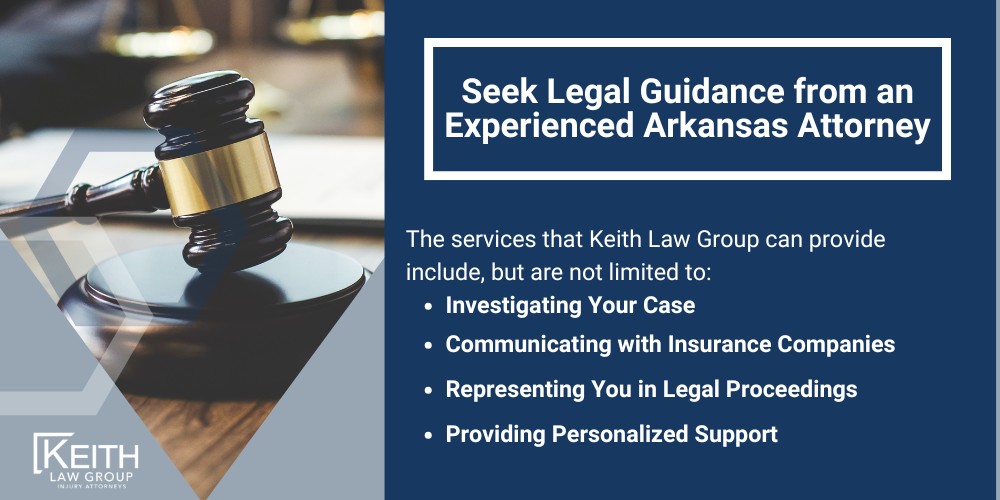
The services that Keith Law Group can provide include, but are not limited to:
- Investigating Your Case: Our team will thoroughly investigate your accident, gathering evidence and consulting with experts to build a strong case on your behalf.
- Communicating with Insurance Companies: We will handle all communication with insurance companies, ensuring your rights are protected and you receive fair compensation.
- Representing You in Legal Proceedings: If necessary, our skilled attorneys will represent you, advocating for your interests and seeking the best possible outcome for your case.
- Providing Personalized Support: At Keith Law Group, we understand that every case is unique. We will provide personalized attention and support throughout the legal process, ensuring your needs are met.
If you or a loved one has been injured in an Arkansas motor vehicle accident, do not hesitate to seek legal guidance.
Contact Keith Law Group using the chat on this page to receive an instant case evaluation to determine your eligibility to pursue compensation for your damages.
Frequently Asked Questions
-
Can I file a police report online in Arkansas?
In most cases, you cannot file a police report online in Arkansas.
However, some cities like Little Rock allow you to submit certain non-emergency reports, such as theft or lost property, through their online reporting system if the incident occurred within city limits.
-
How do I file a police report for a motor vehicle accident?
To file a police report for a motor vehicle accident, contact law enforcement immediately by calling 911 or the non-emergency number of the local police department.
An officer will be dispatched to the scene to document the accident and create an official report.
-
What happens if I file a false police report?
Filing a false police report is a crime in Arkansas.
If you knowingly provide false information to law enforcement, you could face criminal charges, fines, and even imprisonment.
Always provide accurate and truthful information when filing a police report.
-
How can I obtain a copy of a police report?
To obtain a copy of a police report, contact the law enforcement agency that created the report.
You may need to provide identification and pay a small fee to access the report.
Some departments may allow you to request and print the report through their online services portal.
-
What information do I need to provide when filing a police report?
When filing a police report, be prepared to provide your contact information, a detailed description of the incident, the date, time, and location, and any relevant details about the suspect(s) or victim(s) involved.
Inform the officer if you have evidence, such as photos or videos.
All Posts for the Car Accident Lawsuit Legal Guide
Practice Areas
- 3M Earplug
- Belviq
- Bladder Sling
- Camp Lejeune Water Contamination
- Defective Medical Device
- Hernia Mesh
- Hip Replacement
- NEC Infant Formula
- Medtronic Insulin Pump
- Paraquat
- Philips CPAP
- Roundup
- Talcum Powder
- Tylenol Autism & ADHD
- Zantac
- Bicycle Accidents
- Boat Accidents
- Construction Accidents
- Dog Bite
- Drug Injuries
- Electric Shock Injuries
- Nursing Home Abuse
- Nursing Home Bedsore
- Nursing Home Falls
- Nursing Home Infection
- Nursing Home Sexual Abuse
- Personal Injuries
- Premises Liability
- Slip and Fall
- Traumatic Brain Injuries
- Wrongful Death
- 3M Earplug
- Belviq
- Bladder Sling
- Camp Lejeune Water Contamination
- Defective Medical Device
- Hernia Mesh
- Hip Replacement
- NEC Infant Formula
- Medtronic Insulin Pump
- Paraquat
- Philips CPAP
- Roundup
- Talcum Powder
- Tylenol Autism & ADHD
- Zantac
- Bicycle Accidents
- Boat Accidents
- Construction Accidents
- Dog Bite
- Drug Injuries
- Electric Shock Injuries
- Nursing Home Abuse
- Nursing Home Bedsore
- Nursing Home Falls
- Nursing Home Infection
- Nursing Home Sexual Abuse
- Personal Injuries
- Premises Liability
- Slip and Fall
- Traumatic Brain Injuries
- Wrongful Death
You pay
Nothing
unless we win
Do You Have A Case?
Recent Legal Posts & Articles
Recent Legal Guides

Choose Us For Your Personal Injury Case
- Available 24/7
- No Upfront Fees
- Free Case Evaluation
- No Fees Unless We Win!

